Abstract
Protein expression of the putative tumour-suppressor gene DCC on chromosome 18q was evaluated in a panel of 16 matched colorectal cancer and normal colonic tissue samples together with DCC mRNA expression and allelic deletions (loss of heterozygosity, LOH). Determined by a polymerase chain reaction (PCR)-LOH assay, 12 of the 16 (75%) cases were informative with LOH occurring in 2 of the 12 cases. For DCC mRNA, transcripts could be detected in all analysed normal tissues (eight out of eight) by RT-PCR, whereas 6 of the 15 tumours were negative. DCC protein expression, investigated by immunohistochemistry using the monoclonal antibody 15041 A directed against the intracellular domain, was homogeneously positive in all normal tissue samples. In tumour tissues, no DCC protein was seen in 11 out of 16 samples (69%). For the DCC codon 201, we found a loss of a wild-type codon sequence caused by mutation or LOH in at least 8 out of 15 cases (53%) compared with the corresponding normal tissue. DCC protein expression was undetectable in eight of the nine tumours missing both wild-type codons. Only one of the five tumours with retained DCC protein expression had no detectable wild-type codon 201. In addition, 9 out of 15 normal tissue specimens were mutated in codon 201. In two out of three cases with homozygous wild-type codons in peripheral blood lymphocyte (PBL) DNA, mutations were already observed in the tumour adjacent normal colonic mucosa. We conclude that DCC immunostaining should be introduced in the clinicopathological routine because of its strong correlation with the known prognostic markers 18q LOH and mutation of codon 201.
Full text
PDF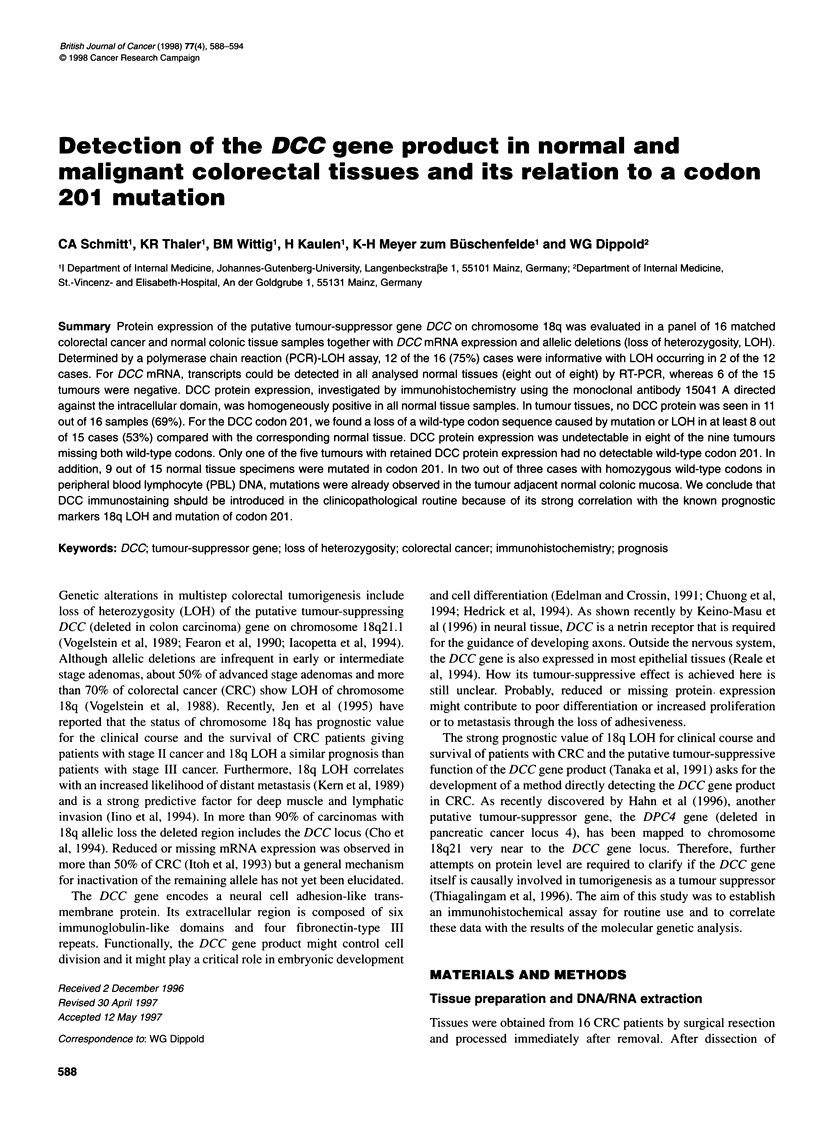
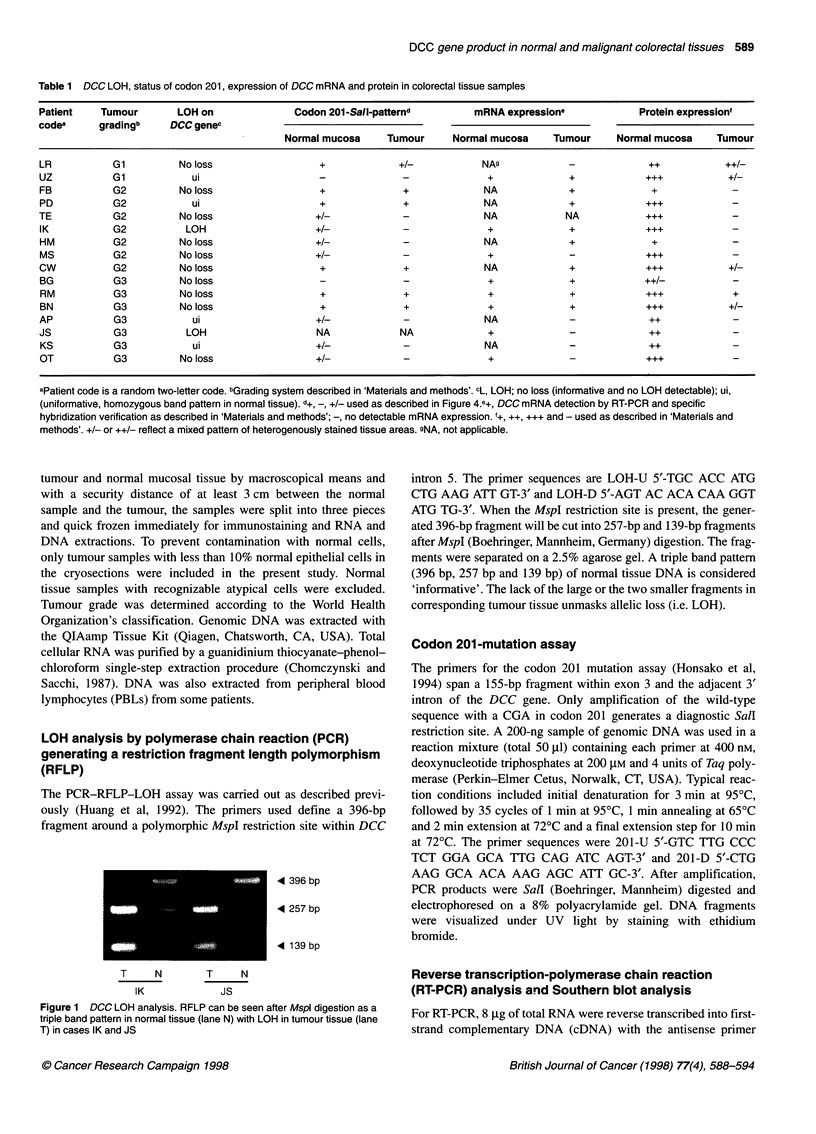
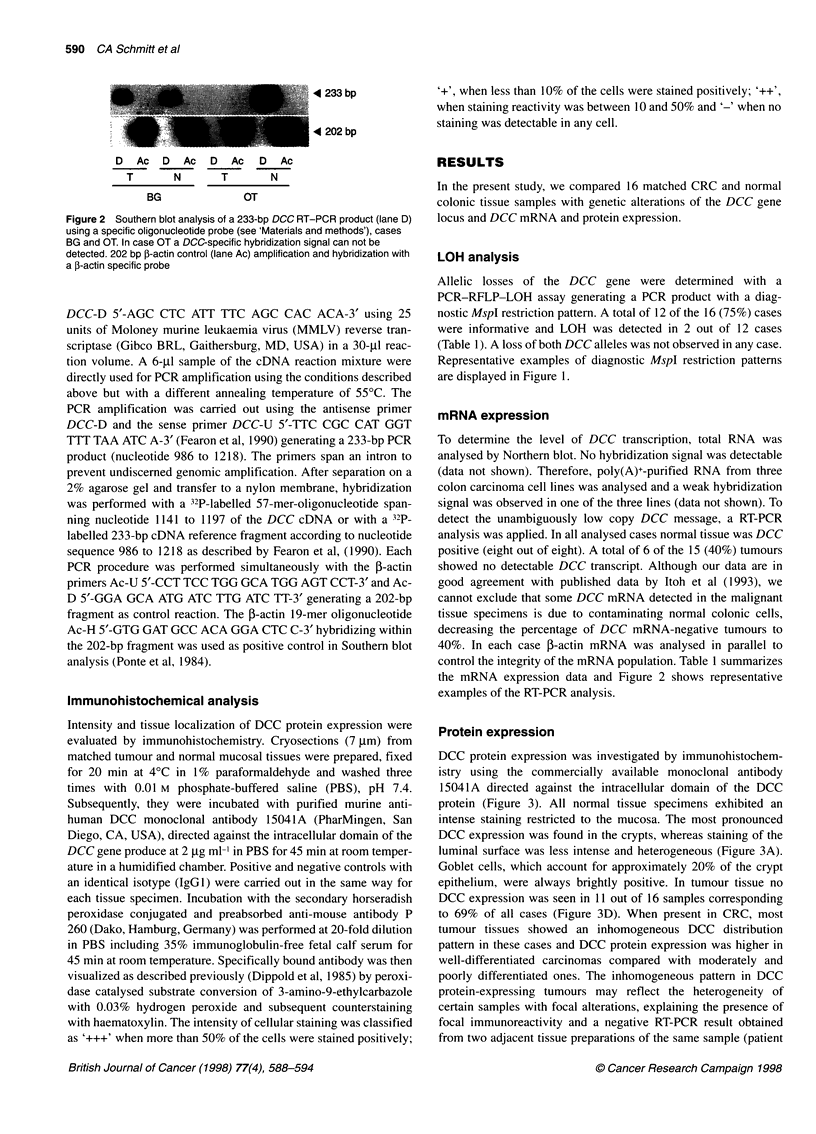
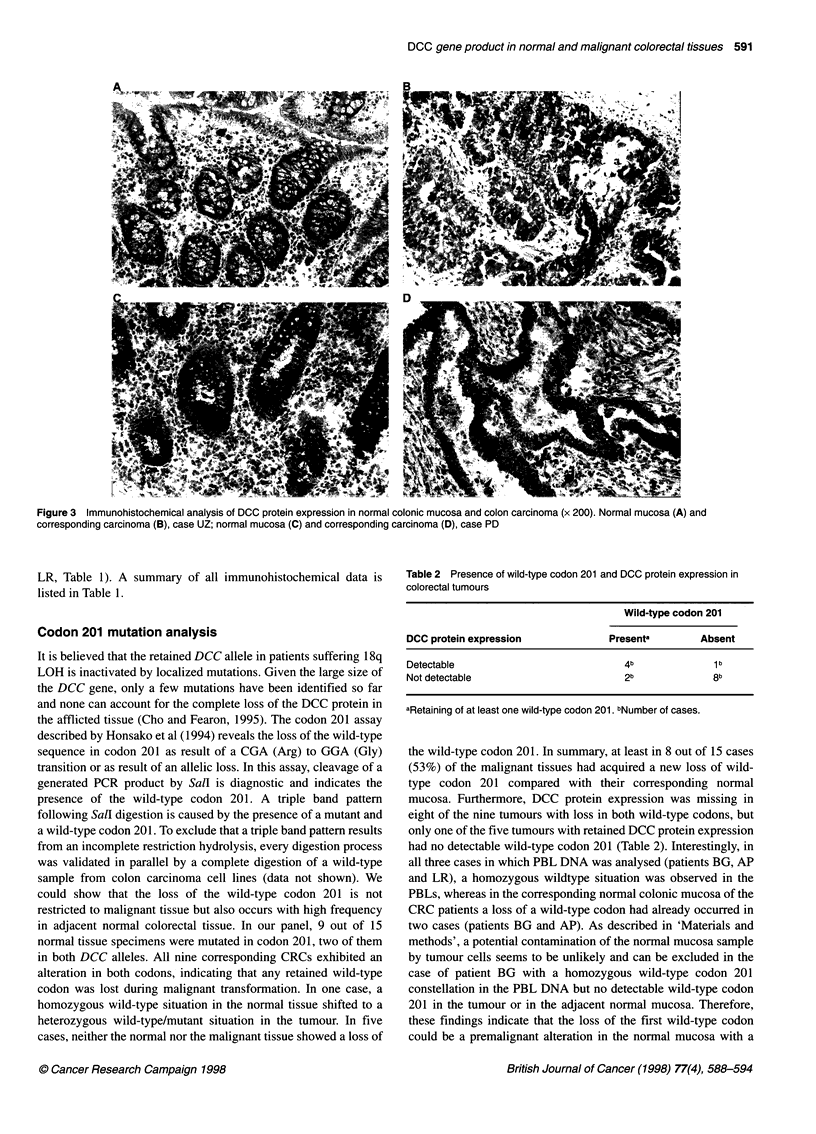
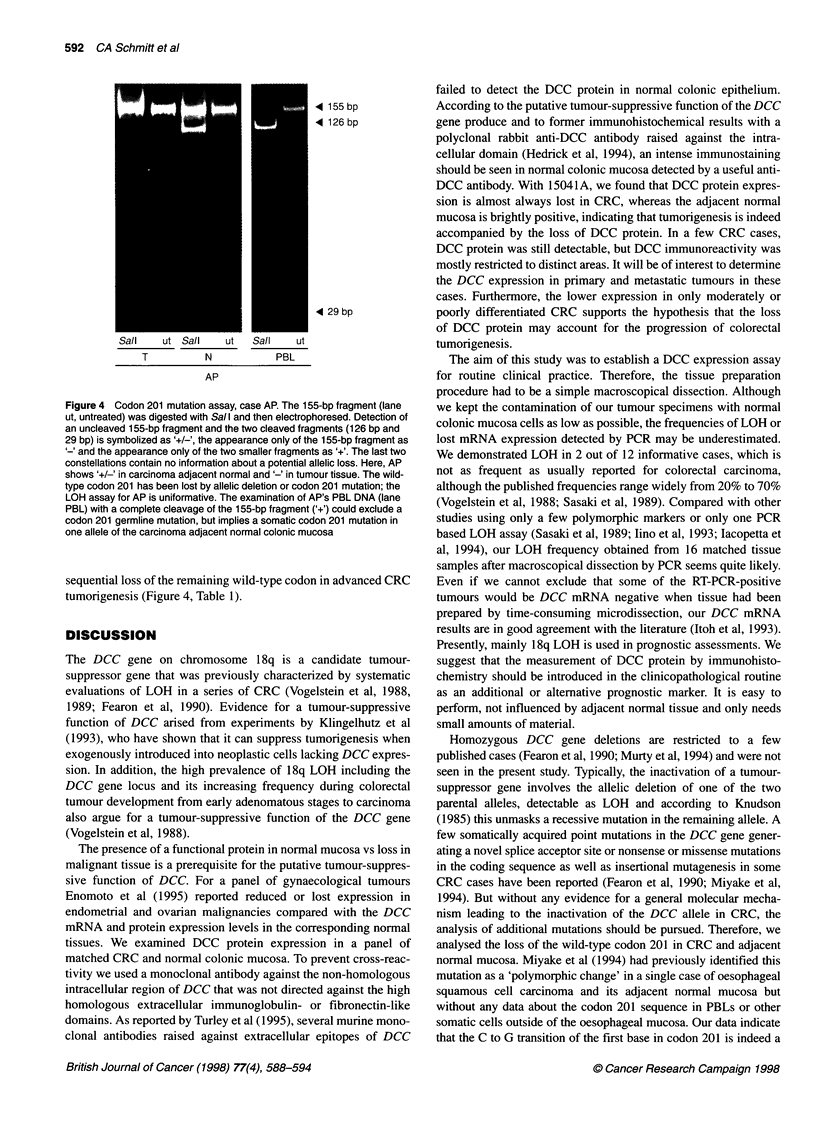
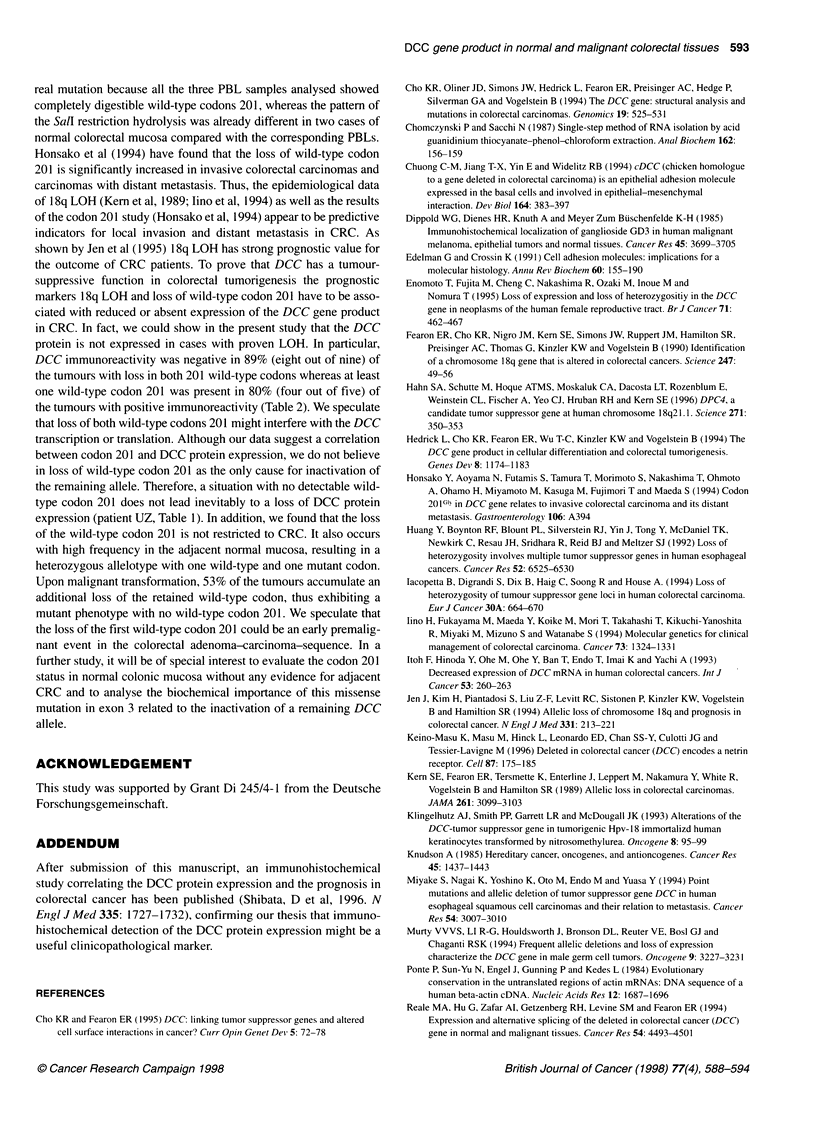
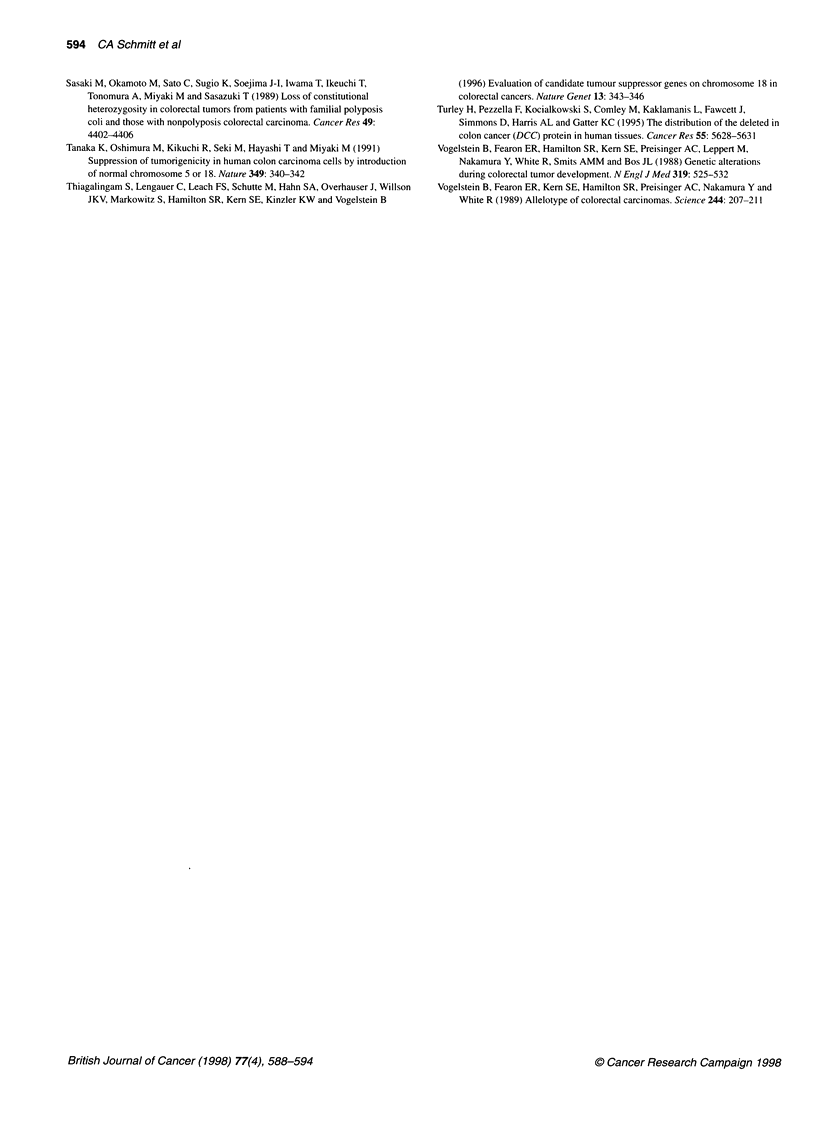
Images in this article
Selected References
These references are in PubMed. This may not be the complete list of references from this article.
- Cho K. R., Fearon E. R. DCC: linking tumor suppressor genes and altered cell surface interactions in cancer? Curr Opin Genet Dev. 1995 Feb;5(1):72–78. doi: 10.1016/s0959-437x(95)90056-x. [DOI] [PubMed] [Google Scholar]
- Cho K. R., Oliner J. D., Simons J. W., Hedrick L., Fearon E. R., Preisinger A. C., Hedge P., Silverman G. A., Vogelstein B. The DCC gene: structural analysis and mutations in colorectal carcinomas. Genomics. 1994 Feb;19(3):525–531. doi: 10.1006/geno.1994.1102. [DOI] [PubMed] [Google Scholar]
- Chomczynski P., Sacchi N. Single-step method of RNA isolation by acid guanidinium thiocyanate-phenol-chloroform extraction. Anal Biochem. 1987 Apr;162(1):156–159. doi: 10.1006/abio.1987.9999. [DOI] [PubMed] [Google Scholar]
- Chuong C. M., Jiang T. X., Yin E., Widelitz R. B. cDCC (chicken homologue to a gene deleted in colorectal carcinoma) is an epithelial adhesion molecule expressed in the basal cells and involved in epithelial-mesenchymal interaction. Dev Biol. 1994 Aug;164(2):383–397. doi: 10.1006/dbio.1994.1208. [DOI] [PubMed] [Google Scholar]
- Dippold W. G., Dienes H. P., Knuth A., Meyer zum Büschenfelde K. H. Immunohistochemical localization of ganglioside GD3 in human malignant melanoma, epithelial tumors, and normal tissues. Cancer Res. 1985 Aug;45(8):3699–3705. [PubMed] [Google Scholar]
- Edelman G. M., Crossin K. L. Cell adhesion molecules: implications for a molecular histology. Annu Rev Biochem. 1991;60:155–190. doi: 10.1146/annurev.bi.60.070191.001103. [DOI] [PubMed] [Google Scholar]
- Enomoto T., Fujita M., Cheng C., Nakashima R., Ozaki M., Inoue M., Nomura T. Loss of expression and loss of heterozygosity in the DCC gene in neoplasms of the human female reproductive tract. Br J Cancer. 1995 Mar;71(3):462–467. doi: 10.1038/bjc.1995.94. [DOI] [PMC free article] [PubMed] [Google Scholar]
- Fearon E. R., Cho K. R., Nigro J. M., Kern S. E., Simons J. W., Ruppert J. M., Hamilton S. R., Preisinger A. C., Thomas G., Kinzler K. W. Identification of a chromosome 18q gene that is altered in colorectal cancers. Science. 1990 Jan 5;247(4938):49–56. doi: 10.1126/science.2294591. [DOI] [PubMed] [Google Scholar]
- Hahn S. A., Schutte M., Hoque A. T., Moskaluk C. A., da Costa L. T., Rozenblum E., Weinstein C. L., Fischer A., Yeo C. J., Hruban R. H. DPC4, a candidate tumor suppressor gene at human chromosome 18q21.1. Science. 1996 Jan 19;271(5247):350–353. doi: 10.1126/science.271.5247.350. [DOI] [PubMed] [Google Scholar]
- Hedrick L., Cho K. R., Fearon E. R., Wu T. C., Kinzler K. W., Vogelstein B. The DCC gene product in cellular differentiation and colorectal tumorigenesis. Genes Dev. 1994 May 15;8(10):1174–1183. doi: 10.1101/gad.8.10.1174. [DOI] [PubMed] [Google Scholar]
- Huang Y., Boynton R. F., Blount P. L., Silverstein R. J., Yin J., Tong Y., McDaniel T. K., Newkirk C., Resau J. H., Sridhara R. Loss of heterozygosity involves multiple tumor suppressor genes in human esophageal cancers. Cancer Res. 1992 Dec 1;52(23):6525–6530. [PubMed] [Google Scholar]
- Iacopetta B., DiGrandi S., Dix B., Haig C., Soong R., House A. Loss of heterozygosity of tumour suppressor gene loci in human colorectal carcinoma. Eur J Cancer. 1994;30A(5):664–670. doi: 10.1016/0959-8049(94)90541-x. [DOI] [PubMed] [Google Scholar]
- Iino H., Fukayama M., Maeda Y., Koike M., Mori T., Takahashi T., Kikuchi-Yanoshita R., Miyaki M., Mizuno S., Watanabe S. Molecular genetics for clinical management of colorectal carcinoma. 17p, 18q, and 22q loss of heterozygosity and decreased DCC expression are correlated with the metastatic potential. Cancer. 1994 Mar 1;73(5):1324–1331. doi: 10.1002/1097-0142(19940301)73:5<1324::aid-cncr2820730503>3.0.co;2-w. [DOI] [PubMed] [Google Scholar]
- Itoh F., Hinoda Y., Ohe M., Ohe Y., Ban T., Endo T., Imai K., Yachi A. Decreased expression of DCC mRNA in human colorectal cancers. Int J Cancer. 1993 Jan 21;53(2):260–263. doi: 10.1002/ijc.2910530215. [DOI] [PubMed] [Google Scholar]
- Jen J., Kim H., Piantadosi S., Liu Z. F., Levitt R. C., Sistonen P., Kinzler K. W., Vogelstein B., Hamilton S. R. Allelic loss of chromosome 18q and prognosis in colorectal cancer. N Engl J Med. 1994 Jul 28;331(4):213–221. doi: 10.1056/NEJM199407283310401. [DOI] [PubMed] [Google Scholar]
- Keino-Masu K., Masu M., Hinck L., Leonardo E. D., Chan S. S., Culotti J. G., Tessier-Lavigne M. Deleted in Colorectal Cancer (DCC) encodes a netrin receptor. Cell. 1996 Oct 18;87(2):175–185. doi: 10.1016/s0092-8674(00)81336-7. [DOI] [PubMed] [Google Scholar]
- Kern S. E., Fearon E. R., Tersmette K. W., Enterline J. P., Leppert M., Nakamura Y., White R., Vogelstein B., Hamilton S. R. Clinical and pathological associations with allelic loss in colorectal carcinoma [corrected]. JAMA. 1989 Jun 2;261(21):3099–3103. doi: 10.1001/jama.261.21.3099. [DOI] [PubMed] [Google Scholar]
- Klingelhutz A. J., Smith P. P., Garrett L. R., McDougall J. K. Alteration of the DCC tumor-suppressor gene in tumorigenic HPV-18 immortalized human keratinocytes transformed by nitrosomethylurea. Oncogene. 1993 Jan;8(1):95–99. [PubMed] [Google Scholar]
- Knudson A. G., Jr Hereditary cancer, oncogenes, and antioncogenes. Cancer Res. 1985 Apr;45(4):1437–1443. [PubMed] [Google Scholar]
- Miyake S., Nagai K., Yoshino K., Oto M., Endo M., Yuasa Y. Point mutations and allelic deletion of tumor suppressor gene DCC in human esophageal squamous cell carcinomas and their relation to metastasis. Cancer Res. 1994 Jun 1;54(11):3007–3010. [PubMed] [Google Scholar]
- Murty V. V., Li R. G., Houldsworth J., Bronson D. L., Reuter V. E., Bosl G. J., Chaganti R. S. Frequent allelic deletions and loss of expression characterize the DCC gene in male germ cell tumors. Oncogene. 1994 Nov;9(11):3227–3231. [PubMed] [Google Scholar]
- Ponte P., Ng S. Y., Engel J., Gunning P., Kedes L. Evolutionary conservation in the untranslated regions of actin mRNAs: DNA sequence of a human beta-actin cDNA. Nucleic Acids Res. 1984 Feb 10;12(3):1687–1696. doi: 10.1093/nar/12.3.1687. [DOI] [PMC free article] [PubMed] [Google Scholar]
- Reale M. A., Hu G., Zafar A. I., Getzenberg R. H., Levine S. M., Fearon E. R. Expression and alternative splicing of the deleted in colorectal cancer (DCC) gene in normal and malignant tissues. Cancer Res. 1994 Aug 15;54(16):4493–4501. [PubMed] [Google Scholar]
- Sasaki M., Okamoto M., Sato C., Sugio K., Soejima J., Iwama T., Ikeuchi T., Tonomura A., Miyaki M., Sasazuki T. Loss of constitutional heterozygosity in colorectal tumors from patients with familial polyposis coli and those with nonpolyposis colorectal carcinoma. Cancer Res. 1989 Aug 15;49(16):4402–4406. [PubMed] [Google Scholar]
- Shibata D., Reale M. A., Lavin P., Silverman M., Fearon E. R., Steele G., Jr, Jessup J. M., Loda M., Summerhayes I. C. The DCC protein and prognosis in colorectal cancer. N Engl J Med. 1996 Dec 5;335(23):1727–1732. doi: 10.1056/NEJM199612053352303. [DOI] [PubMed] [Google Scholar]
- Tanaka K., Oshimura M., Kikuchi R., Seki M., Hayashi T., Miyaki M. Suppression of tumorigenicity in human colon carcinoma cells by introduction of normal chromosome 5 or 18. Nature. 1991 Jan 24;349(6307):340–342. doi: 10.1038/349340a0. [DOI] [PubMed] [Google Scholar]
- Thiagalingam S., Lengauer C., Leach F. S., Schutte M., Hahn S. A., Overhauser J., Willson J. K., Markowitz S., Hamilton S. R., Kern S. E. Evaluation of candidate tumour suppressor genes on chromosome 18 in colorectal cancers. Nat Genet. 1996 Jul;13(3):343–346. doi: 10.1038/ng0796-343. [DOI] [PubMed] [Google Scholar]
- Turley H., Pezzella F., Kocialkowski S., Comley M., Kaklamanis L., Fawcett J., Simmons D., Harris A. L., Gatter K. C. The distribution of the deleted in colon cancer (DCC) protein in human tissues. Cancer Res. 1995 Dec 1;55(23):5628–5631. [PubMed] [Google Scholar]
- Vogelstein B., Fearon E. R., Hamilton S. R., Kern S. E., Preisinger A. C., Leppert M., Nakamura Y., White R., Smits A. M., Bos J. L. Genetic alterations during colorectal-tumor development. N Engl J Med. 1988 Sep 1;319(9):525–532. doi: 10.1056/NEJM198809013190901. [DOI] [PubMed] [Google Scholar]
- Vogelstein B., Fearon E. R., Kern S. E., Hamilton S. R., Preisinger A. C., Nakamura Y., White R. Allelotype of colorectal carcinomas. Science. 1989 Apr 14;244(4901):207–211. doi: 10.1126/science.2565047. [DOI] [PubMed] [Google Scholar]






